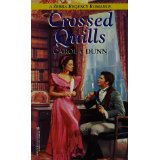Star-crossed authors: Pippa writes Radical political tracts under her deceased father's pseudonym. Wynn Selworth writes spicy Gothic melodramas under the pen-name Valentine Dred. Then Wynn inherits a noble title and must make his maiden speech in the House of Lords. He begs for help from Pippa's father, whose writing he admires. How can Pippa aid him without giving away her secret? How can Wynn keep his racy authorship hidden from the Ton?
Here is a blog about the issue that brings Wynn and Pippa together, the horrid fate of chimney-sweeps' climbing boys: http://murderousmusings.blogspot.com/2013/08/not-exactly-murder.html
 | ||
| The original paperback cover |
Chapter 1
"Brilliant!"
sighed Wynn, tossing the Political
Register onto the
table at his elbow. He leaned back in his chair and reached for his
glass of brandy, a superb pre-Revolution vintage. "I'd give my
right arm to write like that."
"If you gave
your right arm," pointed out the Honourable Gilbert Chubb, "you
wouldn't be able to write at all."
Wynn grinned,
shaking his head at Chubby's invincible literalism. "My left
arm, then. Don't you agree that 'Prometheus' is brilliant? His
arguments are well-reasoned yet pithy, both incisive and persuasive.
Whereas Cobbett's language is far too incendiary to be taken
seriously by anyone but rabble-rousers and the starving masses. Just
listen to this bit here."
Chubby groaned as
Wynn picked up the Register
again, the shilling edition. He no longer had to be satisfied with
the twopenny pamphlet edition, reduced in size from the newspaper to
avoid the stamp tax which put it beyond the reach of the poor.
"No, please!"
Chubby begged. "I don't mind listening to your speeches, old
chap, but I'll be damned if I'll sit still for any more Prometheus,
however pithy."
"My efforts
only make you laugh." Wynn kicked gloomily at the nearest of the
sheets of close-written foolscap scattered on the hearthrug.
"I didn't
laugh."
"You
sniggered. I heard you. I don't blame you, mind. There's no denying
that the style I developed to write those wretched Gothic romances is
as unsuitable for a maiden speech to the House of Lords as a
nightshirt in a ball room. Somehow I just can't seem to keep out the
melodrama and bombast. "
"Seems to me,"
said Chubby judiciously, "you were a devilish sight happier
writing your romances than you have been since your great-uncle
popped off and made you Viscount Selworth."
Excerpt 2:
What was Lord Selworth up to?
Pippa soon found out.
He turned to her mother and said coaxingly, "Mrs Lisle, I must
confess to being here under false pretences. I have come to speak to
you about Prometheus."
Her head whirling,
Pippa gripped her hands tightly in her lap. Had the Government sent
him? Surely William Cobbett had not given away Prometheus's true
identity. However much trouble he was in, blamed for civil disorders
all over the nation, the publisher, editor, and chief contributor to
the Political Register
would not betray his friends.
Cobbett was a true
and generous friend, who paid liberally for Prometheus's articles
despite his own financial woes. Without that income, the Lisles would
be in sore straits—and the income would cease if the world
discovered who had taken over Benjamin Lisle's pen-name.
Cobbett could not
afford to go on publishing articles the world did not take seriously.
How much influence would they exert if it became known that the
author was a mere female?
And a youthful
female, at that!
"Prometheus?" said Mrs
Lisle cautiously. Avoiding Lord Selworth's eye, she tucked a greying
curl under her lilac-ribboned cap.
Pippa regarded her
mother with affection. Mama's calm nature, especially in contrast to
Papa's quicksilver intellect, led some to consider her slow-witted.
Not so her elder daughter.
"Yes, ma'am. I know your
late husband wrote under that name—I must offer my condolences,
belated, I fear. A sad loss to the nation!"
"And to his
family," the widow said with quietly sorrowful dignity.
"Of course.
I...er...You are aware, I daresay, that someone else is now employing
Mr Lisle's pseudonym?"
"Certainly.
The person concerned very properly requested my permission."
"Then you know
who he is?" Lord Selworth enquired eagerly.
"I regret that
I am not at liberty to divulge the name."
His lordship's face
fell, but he rallied. "Perhaps I can change your mind, ma'am,
when you hear why I wish to approach the gentleman."
Mrs Lisle's mouth
twitched, and she cast a quizzical glance at her elder daughter. For
an anxious moment, Pippa feared her mother would be unable to repress
the chuckle quivering on her lips.
However, with
assumed gravity she replied, "I doubt it, Lord Selworth, but you
are at liberty to try."
He smiled at her.
"You are laughing at me, I see. I expect more persuasive men
than I have badgered you in vain. But perhaps their reasons were
less...altruistic. I hope you will consider my aims altruistic."
"Tell me."
Once more his
lordship ran his hand through his hair, increasing its likeness to an
ill-made hayrick. As if suddenly recalling its unfortunate tendency
to go its own way, he then hastily smoothed it down, with a rueful
sidelong peek at Pippa.
It was her turn to
try not to chuckle.
"May
I enlist you on my side, Miss Lisle?" he begged.
"It
is not my place to enlighten you as to Prometheus's identity, sir,"
she said, adding frankly, "I cannot imagine any circumstances
which would change that."http://www.amazon.com/dp/B00457VK8U/ref=rdr_kindle_ext_tmb
http://www.amazon.co.uk/Crossed-Quillls-ebook/dp/B00457VK8U/ref=sr_1_57/280-6342243-5305664?s=digital-text&ie=UTF8&qid=1374874937&sr=1-57&keywords=carola+dunn










